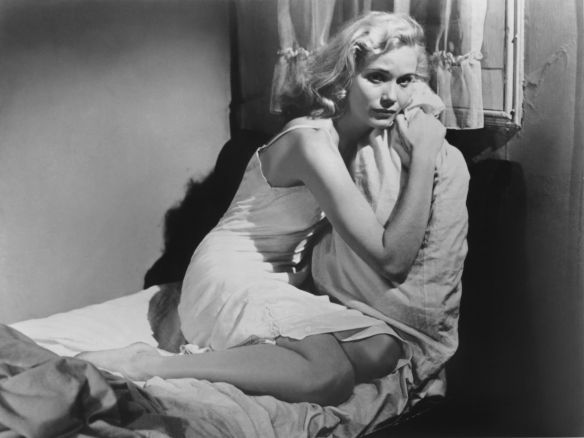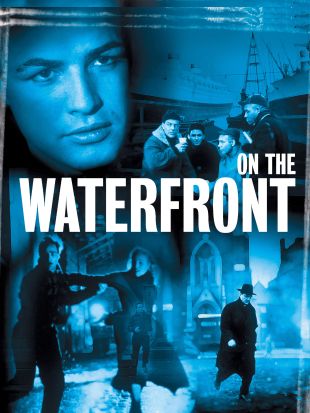
Arguably the best movie ever released by Columbia Pictures and among the finest movies ever made in America, On the Waterfront's reputation has only grown across the half-century since its release. Based on a series of articles about corruption on the New York/New Jersey docks, with a story and screenplay by Budd Schulberg (who also wrote a novel, Waterfront, to tell the story without the compromises necessary for the screenplay), the movie -- directed by Elia Kazan -- retains the feel of truth from the first frame to the last, down to the smallest nuances of the supporting players. Longshoreman Terry Malloy (Marlon Brando) is a washed-up ex-boxer who is a part-time stooge for corrupt union president Johnny Friendly (Lee J. Cobb), who also employs Terry's older, college educated brother Charley (Rod Steiger). As a favor to Johnny, Terry lures a fellow dockworker, Joey Doyle, to the roof of his building -- and Joey is thrown off the roof. All of the men who knew him plead "D & D" (deaf-and-dumb) about who killed him or why, but they all know that Joey was going to answer questions before the Waterfront Crime Commission investigating racketeering on the docks, and that it was Johnny Friendly who had him killed. But Terry can't walk away from Joey's death that easily -- he genuinely thought they were just going to lean on him a little, not kill him, and he can't forget that he set Joey up.
Terry's conscience bothers him just enough so that when he meets Joey's grieving sister, Edie (Eva Marie Saint), and sees Father Barry (Karl Malden), the local priest, trying to find out who killed Joey, they stir some long-buried streak of decency in him. At the same time, although he's not the brightest bead on the rosary (and this is a very Catholic movie, in its imagery and sensibilities), Terry slowly becomes aware that he can tie Johnny Friendly directly to the killing. Johnny starts to doubt Terry and his willingness to keep quiet; Terry and Edie are seen together too often, and they are falling in love with each other, albeit very reluctantly -- even Terry's brother Charley can't reach him anymore. When another longshoreman, Kayo Dugan (Pat Henning), agrees to testify and is murdered, Terry is the next in line for the investigators (Leif Erickson, Martin Balsam). Terry turns out not only to have a conscience but some dignity and self-worth. In the renowned taxi-ride scene with his brother (considered possibly the best dramatic scene between two actors in the whole history of movies), he recounts how Charley never looked out for him when Charley and Johnny handled him as a boxer and made him throw his most important fights -- he's not dead, but he's barely a shadow of who and what he might've been. By this time, the middle ground Terry is standing on is shrinking down to a point -- with a piercing edge -- and he (who is worrying only about himself) has to decide which way he's going to jump off. When Charley is murdered, he makes his decision, precipitating an explosion of pent-up fury on the docks that threatens to destroy both Terry and Johnny.

The acting in On the Waterfront has the aura of truth, and the decision to shoot on location in northern New Jersey gave the film the immediacy and realism of a documentary. Into that mix goes Leonard Bernstein's music (his only film score), which anticipates elements of +West Side Story and, in its editing and mixing into the audio track, imparts a very subtle operatic quality to the otherwise hyper-realistic film. Just check out the interaction of the visuals and the music in the scene depicting the fight at the morning shape-up, especially the build up to the horn flourish at the moment when Terry's friend points out that he's fighting with Joey Doyle's sister. The film is an extraordinary mix of elements both coarse and refined -- harsh realism and art at its most quietly elegant -- in a coherent and compelling whole that still holds up a half century later. On the Waterfront won Oscars for Best Picture, Best Director, Best Adapted Screenplay, Best Actor for Brando, Best Supporting Actress for Saint, Best Cinematography, Best Art Direction, and Best Editing.
